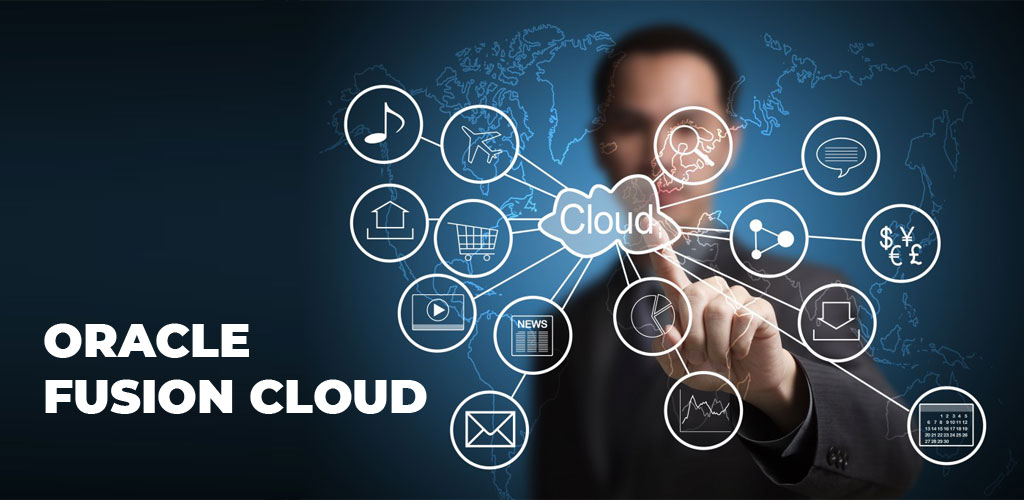Oracle Fusion Cloud – The best ERP software for warehouse
The world of business is fundamentally shaped by ERP software for warehouse, which has close ties to many other significant sectors. No matter what industry a company operates in, ERP software for warehouse is essential to the timely delivery and efficient distribution of its goods. Enterprises engaged in warehousing must have outstanding control over every facet of their operations if they are to meet the demanding market conditions. Failure to do so could lead to waste, delays, unsatisfied customers, and other significant losses.
Overview about Oracle Fusion Cloud
No matter the industry, location, or size, Oracle Fusion Cloud offers a collection of cloud-based ERP software for purchasing, project management, finance, risk management, and other daily activities. It has native connections to all corporate apps from Oracle. To accommodate user, site, transaction, and market expansion, it grows effortlessly. It includes accounting engine, contracts, sourcing, supplier management, narrative reporting, fraud monitoring, financials, revenue management, spending, and more.
It allows cutting-edge innovations like data-rich interactions and is channel-agnostic in terms of context. It automates routine tasks so users may focus on future business planning. Real-time reporting, supply chain management, and long-term scenario planning are all supported.
Key Features of Oracle Fusion Cloud ERP software for warehouse
1. Cloud Financials
It provides extensive financial management capabilities with a teamwork focus. It provides consumers with immediate access to data and insights that boost output and cut costs. Deep internal controls are provided, and it emphasizes important signals and data for prioritizing.
Payables and Assets: Users using Oracle Fusion Cloud may manage payments, balances, and bills. To cut down on errors, it supports optical character recognition. Fixed assets, bank accounts, cash holdings, and forecasts are all tracked and managed.
Accounting and analytics: Real-time interaction, viewing, and dimensional analysis of account balances are all available to users. It allows for self-service reporting and has mobile features. With Oracle Fusion Cloud’s visualization features, users can increase visibility.
Receivables: Oracle Fusion Cloud enables users to manage balances, recognize revenue, create invoices, accept payments, gather client data in one place, manage quotes to cash, and more.
Revenue Management: It establishes contracts and defines performance criteria. Revenues are distributed based on performance criteria. For pre-configured settings and anticipated considerations, it accrues assets and liabilities.
Collections: It follows insolvent clients, drives work to collections, and enhances cash flow with payment capabilities.
Expenses: Users can enter expense information, submit expense reports, and control expenses using level-by-level audits and approvals. Additionally, GetThere and Oracle Project Financials can be linked with it.
2. Accountability Hub
Users are able to easily adjust to changes in policy and construct accounting books for a variety of source systems. They can use references to gain more business intelligence and centralize rules for subledgers.
Deliver Agile Accounting: General ledger, accounting subledger, and transactional systems are all created via Oracle Fusion Cloud. Users can export accounting entries to general ledgers, and it adapts to new accounting policy requirements. The usage of supporting parameters broadens analysis.
Keep in Control: It unifies the subledger accounting rules. Automatic transformation and posting to the general ledger take place. It also examines and corrects mistakes. Users can manage the setup and posting of journal entries using security rules. With faster reconciliation and consolidated accounting with supporting documentation, it improves accountability.
3. Procurement:
Users get access to a strong and influential procurement system thanks to Oracle Fusion Cloud. By managing supplier risk, choosing top suppliers, and enforcing policies, it helps keep prices down.
Sourcing: The features include negotiating efficiency with sourcing teams, requirements collection, and collaboration tools like document sharing. Users can streamline negotiations by using intuitive tools.
Contracting: To enforce company policies, it makes use of contract templates, clause libraries, and contract formation. Users can utilize a secure contract repository, automate renewals, and collect addenda and revisions.
Purchasing to Pay: Automating requests is done by Oracle Fusion Cloud ERP software for warehouse using invoice matching and payment. By locating the required services and commodities, it makes purchasing easier. To ensure savings are maximized, it upholds agreed-upon conditions and prices.
Management of Suppliers: In order to promote supplier compliance and initiatives, it evaluates suppliers. It records modifications to supplier data and acts promptly when supplier capabilities, qualifications, or risk change.
4. Risk Administration
This function provides financial management. It automates analysis for task separation, preventing financial fraud, and designing roles for ERP.
Creating Secure Roles: By settling on roles before going online, it ensures audit preparedness. Users can configure employee roles by selecting from 100 customisable, prebuilt security roles and running analyses.
Automated Audit Controls (AACs): Users can track changes to master data and spot security flaws and threats. By allowing users to customize more than 200 pre-built controls, deployment is sped up.
Controls for transactions: It examines every aspect of ERP processes, including setups, roles, users, and transactions. To prevent errors, cash leakage, and violations, users can keep an eye on ERP activities including accounts payable and receivable and general ledger monitoring.
5. Planning a project:
The project management module of Oracle Fusion Cloud is a complete solution that enables efficient project management. It includes social and mobile functionality that enables group communication.
Resource Administration: It provides search capabilities for users to locate project resources. It monitors performance indicators so that users can learn more about the skills and resource availability. Additionally, it arranges resource pools.
Management of Tasks: Users can communicate through task discussions and annotated documents while working together on a variety of projects. A simple click provides information on the status of the project.
Controlling project costs: Project forecasting, planning, and budgeting are made easier by it. Project expenditures are standardized, under control, and streamlined. It controls asset costs as well.
Payment and Agreements: Users can easily and rapidly bill project clients. Users can adhere to the terms and conditions of the project. Additionally, it simplifies contract revenues and takes advantage of contract-project linkages.
Key Advantages of Oracle Fusion Cloud
Providing business insights: Oracle Fusion Cloud ERP software for warehouse generates insights by consolidating several data sources into one place. Results can be analyzed by users using multi-dimensional reporting. To examine the findings, they can employ corroborating sources. Additionally, it delves into subledgers.
Make Decisions More Efficiently: By utilizing speed, current applications, scalability, and new technology, users may streamline decision-making. An integrated, complete package called Oracle Fusion Cloud uses cutting-edge technologies like machine learning and artificial intelligence to help with planning and decision-making.
Encourage operational excellence: Users can expedite procedures including publishing reports, completing and submitting regulatory compliance declarations, and closing the books. Additionally, it streamlines old systems, makes use of cloud-based AI and machine learning tools, and reduces or does away with the requirement for customization while creating agile operating prototypes.
Improve the output of reports: By minimizing the amount of time employees spend on reporting procedures and allowing them to concentrate on tasks like sourcing, supply optimization, spend analysis, contract negotiation, and supplier development, users can boost reporting productivity.
Applications for Adaptation: With the help of machine learning and intelligent applications, Oracle Fusion Cloud’s artificial intelligence makes better decisions, boosts productivity, and produces better outcomes.
Control complexity: IoT solutions that increase business processes across customer experience, HR, and ERP apps are supported. Better business outcomes and more effective opportunity discovery are made possible by these inclusions.
Cutting costs: Blockchain applications that are already embedded into Oracle Fusion Cloud eliminate middlemen, boost speed, and minimize costs. They also give business processes transparency and traceability.
Conclusion
In summary, an integrated business suite for your operation is essentially what ERP software for warehouse is. It is made to gather, store, and handle data from numerous departments within your company. This frequently includes details on product planning, inventory management, sales, marketing, customer service, sales, and e-commerce.
The full financial reporting capabilities of the ERP software for warehouse, which let you invoice, bill, track, etc., make it very beneficial. Other systems will feed data into the WMS, making it a central data repository for your whole company.
Read more: https://alltin.net/blackboard-collaborate-the-best-web-conferencing-software-for-small-business/







